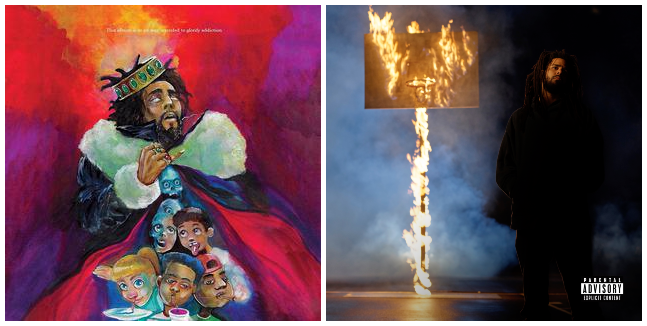KOD to The Off-Season: What Changed?
The album covers for KOD (left) and The Off-Season (right), released three years apart, side by side. The artwork for KOD by Kamau Haroon, a.k.a Sixmau, includes a disclaimer at the top reading, “This album is in no way intended to glorify addiction.”
June 3, 2021
In 2018, hip hop artist J. Cole dropped his fifth album, KOD. The conscious-rap album broke streaming records on both Spotify and Apple Music since the day of its release and has since garnered over 64 million streams on Apple Music. It was also nominated for album of the year at the 2018 BET Hip Hop Awards and was nominated for Favorite Album at the 44th People’s Choice Awards. On May 14, 2021, the anniversary of his mixtape debut, Cole released his sixth studio album, The Off-Season. Over the past three years, both his lyrics and style have grown beyond what they once were.
The title of KOD represents its overall theme, the perils of drug abuse. KOD has three different meanings, standing for Kids On Drugs, King Overdosed, and Kill Our Demons. In the album, Cole writes about the effects that drug addiction and use have on youth in America. He warns against drug use from the perspective of an addict, which seems to be an obvious response to the culture of drug abuse that mainstream music often encourages. He also touches on topics like gang related violence, social media relationships, underfunded resources for impoverished communities, materialism, and more.
The announcement of The Off-Season came as a welcome surprise to many fans that hadn’t expected an album this year. Before it was officially announced on May 4, Cole posted a photo on his Instagram, @realcoleworld, hinting at his plans. The photo showed a paper list of steps he planned to take, with the first two crossed off. Titled “The Fall Off Era,” it included “features” (crossed off), “ROTD3” (Revenge of the Dreamers lll, a compilation album by Dreamville in 2019), and then “The Off-Season,” yet to be crossed off. In an interview with SLAM Magazine, Cole explained the meaning of The Off-Season’s title in connection with basketball. The offseason of a serious athlete’s sport is meant to entail pushing yourself to your greatest limits.
“The Off-Season symbolizes the work that it takes to get to the highest height. The Off-Season represents the many hours and months and years it took to get to top form,” Cole said. “The offseason is where the magic really happens, where the ugly shit really happens, where the pain happens…It represents the time spent getting better and pushing.”
Throughout the album, Cole revisits old themes and reflects on the music he made then and now. Contrasts between life and death, poverty and riches, success and failure, all appear in different songs. While some tracks like “The.Climb.Back” and “Pride.Is.The.Devil” include social commentary on police brutality and gun violence, the majority of the album is based upon self-reflection. Cole centers himself, who he is, and his experiences above all else. This was a shift away from KOD, along with his other politically focused albums.
In KOD, Cole talks about his relationship with his mother and the strains that her addiction put on him. In “Once An Addict (Interlude),” he writes, “hate how she slurring her words/sounding so fucking absurd/this ain’t the woman I know/Why I just sit and observe?” and “little did I know how deep her sadness would go/looking back, I wish I woulda did more/instead of running”. He references his own struggles with drugs in the track “KOD”, “I smoke the drug and it run through my vein/I think it’s working, it’s numbing the pain.” “Window Pain (Outro)” tells the story of a young Black girl who witnessed her cousin get shot and killed.
In The Off-Season, Cole references how much his life has changed since becoming rich and famous, rapping on “Amari” that “out of the concrete was a rose”. In “100.mil” he references the off-season concept of his album, with “how come a n**** ain’t enter his prime?/Still gettin’ better after all this time” and “the moves that I made, the people I fed, the evil I ducked/they minds is too feeble, they lean on they crutch/I’m bleeding from fighting my demons head up/when I get defeated, believe I get up”. In “Let.Go.My.Hand”, Cole talks about fatherhood, spirituality, and his own self growth. “I dibble-dabble in a few religions/My homie constantly telling me ‘bout Quran, puttin’ me on/I read a few pages and recognize the wisdom in it/but I ain’t got the discipline for stickin’ with it,” he raps.
While KOD was a solo album with no features, The Off-Season featured Lil Baby, 21 Savage, Morray, Bas, and 6LACK. These came as a surprise, with no prior announcements that anyone would join J. Cole. His three most recent albums, 2014 Forest Hills Drive, 4 Your Eyez Only, and KOD lacked any features, something he boasted about in the track “KOD”: “‘How come you won’t get a few features, I think you should’/How ‘bout I don’t.”
Cole plans for his upcoming album The Fall Off, of which he has already released two songs, to be his last. Wrapping up “The Fall-Off Era” and his career with one swoop, J. Cole’s advancement and transformation as an artist is not yet complete.


